- Home
- Antonia Fraser
Oxford Blood Page 19
Oxford Blood Read online
Page 19
'It goes like this,' she continued. 'There were two babies. One was your mother's, I mean Lady St Ives' baby, this is getting confusing but you know who I mean—'
'It's definitely too late to think of Eugenia Jones as my mother,' said Saffron firmly. 'Go on.'
'This baby dies at birth on the twenty-eighth of October, but is smuggled a way by Nurse Elsie, and buried under the name of Jones -Saffron Jones, as it happens. They used your real date of birth and its own date of death for the certificate. Then there's the true Saffron Jones -that's you - who was born to Eugenia on the twenty-sixth of October and substituted for the dead baby. So it - he - you grew up as Lord Saffron.'
'Both of them my father's sons.' Now Saffron sounded almost angry. 'The most shocking thing about all this, more shocking than anything else you've told me is that my father, the most upright man in Britain as he is famously regarded, my father had an affair, a long long affair with Eugenia Jones. Including when my mother was having a last desperate stab at having a baby.'
He stopped.
'Oh Tiggie. Oh Christ, poor Tigs - is what you're saying that Tiggie was my sister?'
Jemima nodded. 'Your full sister. I thought at first she was your half-sister. But now I think that there was never any Jones, ever. Just a hidden love affair. And a child. And then - perhaps when the affair was nearly over, another child.'
'Christ. It's unbearable. The hypocrisy of it.'
They were in Saffron's rooms at Rochester. A huge poster-size picture of Tiggie, panda eyes and all, taken by some fashion photographer Jemima guessed, gazed down at them. Someone - Saffron? - had written RIP underneath it.
The room had a desolate feel to it. There was a pile of unopened letters and notes on the table and some books. None of the invitations on the mantelpiece looked particularly recent, nor were there any empty champagne bottles to be seen; the cricket bat still reposed in the corner of the room with the tennis rackets and the squash rackets. They were neatly stacked, and did not look as if they had been in recent use. The sight of an enormous golfing umbrella, open and sodden, spread across the hearth rug reminded Jemima that outside the Hawksmoor quad was equally desolate, with driving squalls of cold rain, of the sort that Cy Fredericks for one would never believe could belt down in Oxford in June as the summer term reached its climax.
What were they to do if it rained throughout Commem week? Could even the legendary skill of Spike Thompson create idyllic punting on the river, the balm of a summer night, the rising luminosity of an Oxford dawn when rain was beating down on all parties concerned? 'No long shadows', had been Cy Fredericks' firm instructions. Like King Canute, Cy Fredericks might have to bow to the inexorable force of the English climate.
Saffron, hunched in a T-shirt bearing some message of vaguely revolutionary - or perhaps satirical - import, and torn white track-suit trousers, bare feet (his soaking sneakers put to dry by a small smoking fire) now looked merely depressed as well as angry. The resemblance to Eugenia Jones that fatal weekend at Saffron Ivy, was marked. And his height came from his father. The B blood and the A blood. Ah well, thought Jemima, at least he gets his brains from his mother. A for aristocratic blood and B for brains. She still found it irresistible to think in terms of blood grouping.
On the other hand one could hardly suggest that Lord St Ives had no brains, no intelligence, no cunning, no shrewdness ... She wanted to tell Saffron about her recent lunch with Lord St Ives then decided against it. Saffron had enough to bear, enough to sort out.
Lord St Ives had responded to her invitation to lunch with his usual enchanted - and enchanting - courtesy. In spite of Jemima's determination not to be put in thrall by the old fox's charm, as she put it to herself, she found herself believing that her invitation had totally transformed a rather dim day at Saffron Ivy.
'How delightful ... we never did get to know you ... tragic weekend .. . how is my son? I assume you've seen him at Oxford since the funeral that is.'
'I will be seeing him.'
'Good, good ... Such an admirable influence.' The flattering phrases flowed on, then: 'Gwendolen would so much like to meet you again' -but I didn't ask her, thought Jemima in a panic - 'however, as you know, she never comes to London these days ... Her health, alas ... Another time at Saffron Ivy ... When you feel ready...'
Curiously, Lord St Ives showed no signs of asking Jemima what the lunch was about. It was only when Jemima suggested Le Caprice that Lord St Ives exhibited some degree of interest. Le Caprice was convenient for what she conceived to be his Mayfair/St James's/Whitehall orientation and she wanted to be on her ground not his.
'Le Caprice? The smartest restaurant in London! That does sound exciting. I expect my son goes there. Ah no, alas. Please excuse the selfishness of an elderly man, Miss Shore, but I'm afraid I must insist on being the host at this luncheon. For one thing it's much too late for me to learn to be paid for by a lady; I should be in the most dreadful state throughout, wondering what I dared eat and drink without ruining you. No, I'm sure your salary is enormous. But secondly you must indulge me and allow me to be seen with a pretty woman somewhere where it will add enormously to my prestige. What a fillip it will give to my reputation to be seen with you!'
Lord St Ives suggested Wilton's. Jemima, feeling out-manoeuvred, agreed.
As smoked salmon followed by lamb cutlets (Lord St Ives) and dressed crab (Jemima) were brought with a stately courtesy equal to Lord St Ives' own, by waitresses like ageing family nannies in white overalls - here at last were the traditional retainers of her dreams - Jemima wondered desperately whether the whole lunch would pass without her being able to step out of this warm bath of politeness.
In the end it was Lord St Ives who turned the topic of conversation from a mixture of gardening and Tory politics ('what kind of roses do you suppose Mrs ‘I. admires? Huge strong-growing hybrid teas, I fear') to something more personal. First he waved on the raspberries:
'Yes, yes, you must - raspberries for Miss Shore, a nice large helping and lots of cream. Some Stilton for me.'
Then he looked at her directly. She thought for the first time that Lord St Ives had a very sad face in repose. She still could not see Saffron's features in his, Saffron having the full mouth of his mother, Lord St Ives the narrow mouth beneath the straight nose of the crusader. But those mannerisms which she had once thought 'nurture not nature' and the figure, the long legs and narrow shoulders, all these Saffron had inherited from his father.
'My son, Miss Shore,' said Lord St Ives in a gentle voice, 'I think you want to talk about my son. He is my son, you know.' 'I do know that - now.'
'But you doubted it.' There was a long pause. Then Lord St Ives went on, still in the same quiet tone: 'Nurse Elsie, Miss Shore. A very indiscreet woman, at least when she was dying. She told my wife she had seen you. Without saying why: just that you were interested in her story. Gwendolen passed it on to me. I - shall we say I held myself in readiness, Miss Shore? Then things began to fall into place. Your interest in Saffron, for example. Other things: that conversation about blood groups at dinner; altogether too pat, too convenient. Am I correct?'
Jemima nodded.
'That wretched woman.' Lord St Ives heaved a sigh. 'But then who am I to judge someone dying of cancer?'
'Who wanted to make her peace with God,' concluded Jemima. 'I'm not a Catholic, but who are we to judge her harshly for that?'
'"Never trust a Catholic servant," Gwendolen's mother, old Hattie Wiltshire, a frightful dragon, used to say. "Sooner or later the Pope starts giving them orders instead of you." That's going a bit far perhaps, but in this case perhaps justified. Nurse Elsie's peace did cause a great deal of strife for the rest of us, didn't it?'
'At least the truth is known. That's a good thing.' Jemima sounded more convinced than she felt.
'Is it? I envy your certainty, Miss Shore. A lifetime in politics has taught me that truth can be just as damaging as lies. A depressing conclusion, perhaps. Ah well - you are not here to liste
n to my political reminiscences. Who knows this particular truth? You know it. Does my son know it? Andrew and Daphne Iverstone?' He gave a slight grimace.
'Nurse Elsie told Saffron the first part of it. It was terribly upsetting for him, naturally. He half believed it, half rejected it. I think it was partly responsible for him going off the rails. All that business with the restaurant.' She tried not to let an element of reproach creep into her voice. 'Now I can tell him the second half of it. The other Iverstones - no, they don't know.' Jemima devoutly hoped this was also the truth. 'I'm going down to Oxford to see Saffron.'
'Do you judge me very harshly? I see you do. Before you go down to Oxford, Miss Shore, let me tell you a story. A love story if you like, a love story of long ago. Or perhaps a story of guilt.'
Then Lord St Ives, in quite simple language, his affectations of enchantment and enthusiasm dropped, told Jemima the story of the married man, the rising Conservative minister, who encountered the unmarried young woman, the beautiful and intelligent young woman, quite unexpectedly, by one of those improbable coincidences which should never have happened, might never have happened, in the course of their shared work.
'The Ministry of Defence. I was Minister for Defence in the late fifties, not for long, but long enough. And Eugenia, you've probably heard this, worked for them for a period. Someone from another world. I'd never really known anyone, any woman that is, like Eugenia before. Such wildness, such passion. There'd been occasional - well, flings - Gwendolen always in the country, no, I don't want to apologize for them - but never love. I'd always wanted to love someone: and then I loved her.'
'You loved her. Did you also want to marry her?'
'There was never any question of that. I could never leave Gwendolen. How could I? An innocent woman. What had she ever done wrong?'
'Did Eugenia want—'
'She said not. I don't know. At any rate she accepted it was impossible. I took her once to Saffron Ivy: a risk, that. My mother-in-law was dying. Gwendolen went to be with her. The excuse was to look at the library, that's what the servants were told. I've no idea if they believed it. Oddly enough, I think it was then that Antigone was conceived. And then Eugenia insisted on having the baby. I helped her. Jones was invented of course: a convenient fiction, his birth and equally convenient death.'
'I worked that out.'
'It was after that, after Antigone's birth, we parted. Did you work that out too? Gwendolen was so terribly unhappy. She knew.'
'She knew about Eugenia?' Jemima was startled.
'Not in so many words. She knew something was up. Don't people always know that sort of thing? But someone told her something: I've always suspected Daphne Iverstone, as a matter of fact. So we parted, Eugenia and I.'
'But then - Saffron - and the other baby which died. Very much the same age. Born within forty-eight hours of each other.'
'Wasn't it odd? Almost as if it was fated. By chance once more, I met Eugenia again. I was Foreign Secretary by then. There was some visiting Greek dignitary, some banquet. Gwendolen was in the country. We took the chance, the risk. One night, not even a night. I went back to Saffron Ivy full of guilt. And a few days later - need I go into this further? - the other baby was conceived. Gwendolen had lost so many children. But she was determined to have one last chance. Even the doctors didn't want her to try.'
'That baby died.'
'I nearly went mad. Gwendolen was hoping for so much in spite of the doctors. And it was then that the idea came to me. Nurse Elsie was looking after Eugenia too: in a way it was strangely easy. You see, Eugenia once again refused to have an abortion. I couldn't make her, I thought it was a mistake. The affair was over, she was making a new life. She was just beginning to see Proffy; he had, I think, just fallen in love with her. The baby was going for adoption. I was half crazy, I admit it. All Nurse Elsie had to do was tell Eugenia her child had died.'
'So Eugenia didn't know what had really happened to her child.' Jemima was astonished.
'Not then, not for years. Our paths didn't cross. We took care in fact to avoid each other. Myself in London or Saffron Ivy; Eugenia in Oxford; we never had any friends in common, that was part of the fascination, I suppose. It never occurred to me that Antigone's path would cross with Saffron's: the one thing I never thought about. And yet somehow, by another kind of strange fate, they seemed drawn to each other.'
'When did Eugenia know? I got the impression that she did know. That she regarded the engagement with horror as a result.'
'Nurse Elsie. Told her too on her deathbed in her grand confessional mood. She sent for Eugenia after sending for you.'
So that was the other woman, thought Jemima, who came on the last day of all to the Hospice. I suspected Daphne Iverstone.
'As for the engagement,' pursued Lord St Ives, 'we were both appalled. But separately. I tried to speak to Eugenia about it, but Proffy wouldn't let me meet her. He's quite jealous of her in his Pasha-like way. So I wrote to her: a carefully guarded letter, because for one thing I did not think the truth should be committed to paper, suggesting that the matter would be sorted out at Saffron Ivy. My plan was to put them off without revealing the truth: they were both so young, so capricious, it could happen naturally. This engagement came from nowhere, one of Saffron's schemes. We could sort it out. I could sort it out.'
Jemima thought: and in its own tragic way, it was sorted out at Saffron Ivy. But she did not say so.
None of this did she think it right to pass on to Saffron.
There was one last question for Lord St Ives.
'Forgive me, your wife? You said people always know. Did she know this too?'
'There was a time: he was such a dark little baby, she used to comment how odd it was. Then a time came when she never mentioned the subject of his looks. After that she began pointing resemblances to Saffron in the Iverstone family portraits, almost as if she wanted to reassure herself. They say a mother always knows. But then, Miss Shore, to me she was his mother.'
'As you were his father.'
'In exactly the same way,' concluded Lord St Ives firmly. 'In exactly the same way.'
'And in addition to saving your wife, you saved your estates. So you protected your own walls.'
'Like the ivy, in the family motto? That's also true. But now, Miss Shore, would you have wanted Saffron Ivy to pass to Andrew Iverstone?'
'A nice liberal dilemma. But now there's Jack of course. He's a decent fellow.'
'Very decent. Almost too decent I sometimes think; as though he was repressing quite different feelings. But I could hardly have expected Andrew and Daphne to have a son like Jack, could I? Heredity is certainly a very odd thing.'
It was Lord St Ives' last word on the subject of the Iverstone family.
To Saffron in Oxford, Jemima said:
'Don't judge him too harshly - your father.'
‘I don't want to judge anybody!' exclaimed Saffron fiercely. 'And I don't want to be judged either. Let him try to come the heavy father on me now, lectures about my way of life, no way, that's over.' He laughed angrily and leapt up with a kind of furious grace, which reminded Jemima of his antics on the tennis court.
'Let's have some champagne.'
Jemima shook her head. 'I don't want any. I'm meeting the cameraman and the director, down by the river at St Lucy's. Much need for Megalith mackintoshes.'
'Oddly enough, I don't want any either. You may not believe this, Jemima, but I'm absolutely fed up with all that shit. Golden Kids and all that. I'm thinking of going straight. Cousin Jack will be amazed. He's always given me moral lectures about waste and the family honour. I'm actually thinking of working.'' He made it sound as unlikely an activity as going to Xanadu.
'And one last thing, Jemima, I'm not taking part in that fucking programme. You can tell Megalith Television to go and stuff themselves. Let the others get on with it: there are plenty of Golden Kids in Oxford. The Gobbler, Poppy and the rest of them. No lack, whatsoever. But you can include me ou
t, in the immortal words of Sam Goldwyn.'
Saffron stopped. 'So what do you think of that, beautiful but icy Jemima?'
'I'm not icy. Just cold. I find I prefer Cy Fredericks' idea of Oxford with golden sunshine playing on the arcades rather than puddles: dreaming spires, not spires teeming with rain.'
'You look icy. Icy towards me.'
'As a matter of fact I feel quite warmly towards you.' 'Not disappointed about your programme?'
'It's only television,' said Jemima lightly, hoping that the lightning, dispatched by Cy Fredericks, would not come to strike her dead. 'As a matter of fact, I think it's probably the first sensible decision you've made in your life.'
'I'll come to the Commem. I mean, I'm not aiming to become a monk, for God's sake. It's my own College, I've got the tickets.' He paused. 'But I haven't got a partner, have I?' There was a silence. 'Jemima—'
'I'm working, Saffron,' said Jemima hastily. 'You may have opted out of Golden Kids but some of us are not so lucky. Do you realize that if I don't make this programme successfully, this darling of my boss's heart, he could send me to the Siberian equivalent of the saltmines, which in Cy's case could be making a six-part series of programmes about Common Market attitudes to the EEC?'
'I thought the Common Market was the EEC
'That's my point.'
'Not as much fun as a programme about the Radical Women's Settlement. To which I was once going to give some money if you acted as my private investigator.' Saffron hesitated. 'Jemima - have you thought about all that?'
Jemima wondered what she should say. She had indeed thought about 'all that'. She had gone through over and over again both in her head and with Cass the various murderous attacks, one successful but hitting the wrong target and one failed. Bim Marcus who died on Staircase Thirteen, Saffron attacked with the boat hook at the Chimneysweepers' Dinner. And then there was Tiggie, fatally injected with a massive dose of drugs, Tiggie who feared the needle and yet had died by it. She was beginning to see a connection, in terms of the various people who had been present on all three occasions; the names of those who had the opportunity led her inexorably to the motive, the obvious motive. Envy.

 Warrior Queens
Warrior Queens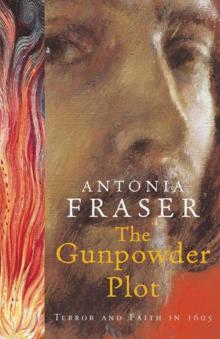 The Gunpowder Plot
The Gunpowder Plot Cromwell
Cromwell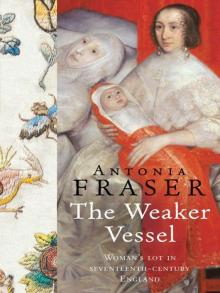 The Weaker Vessel: Women's Lot in Seventeenth-Century England
The Weaker Vessel: Women's Lot in Seventeenth-Century England Marie Antoinette: The Journey
Marie Antoinette: The Journey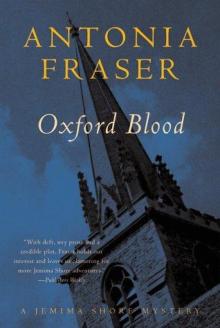 Oxford Blood
Oxford Blood Your Royal Hostage
Your Royal Hostage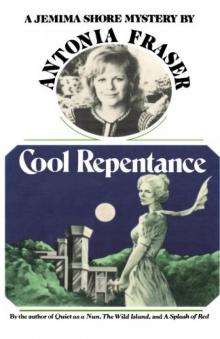 Cool Repentance
Cool Repentance Mary Queen of Scots
Mary Queen of Scots Political Death
Political Death Royal Charles: Charles II and the Restoration
Royal Charles: Charles II and the Restoration My History: A Memoir of Growing Up
My History: A Memoir of Growing Up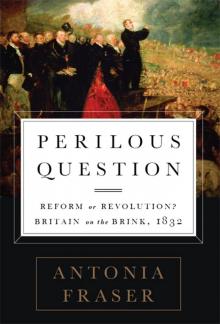 Perilous Question: Reform or Revolution? Britain on the Brink, 1832
Perilous Question: Reform or Revolution? Britain on the Brink, 1832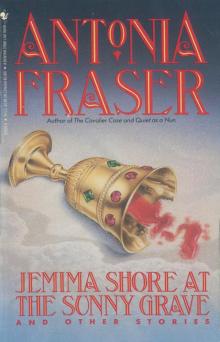 Jemima Shore at the Sunny Grave
Jemima Shore at the Sunny Grave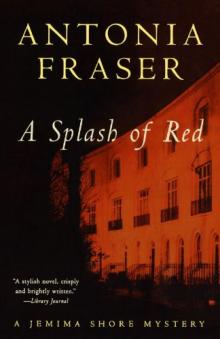 A Splash of Red
A Splash of Red Must You Go?: My Life With Harold Pinter
Must You Go?: My Life With Harold Pinter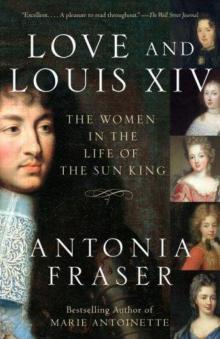 Love and Louis XIV: The Women in the Life of the Sun King
Love and Louis XIV: The Women in the Life of the Sun King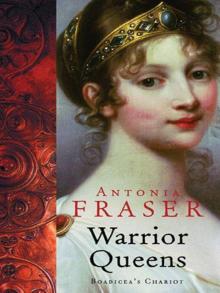 The Warrior Queens
The Warrior Queens The Wild Island
The Wild Island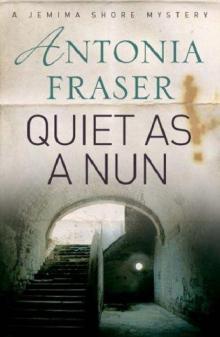 Quiet as a Nun
Quiet as a Nun Perilous Question
Perilous Question Cromwell, the Lord Protector
Cromwell, the Lord Protector Gunpowder Plots
Gunpowder Plots The Wild Island - Jemima Shore 02
The Wild Island - Jemima Shore 02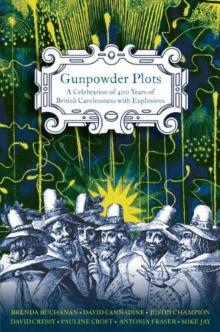 Gunpowder Plots: A Celebration of 400 Years of Bonfire Night
Gunpowder Plots: A Celebration of 400 Years of Bonfire Night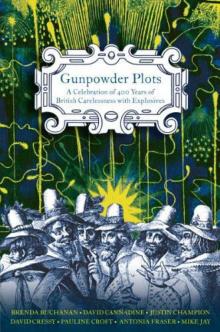 Gunpowder Plots_A Celebration of 400 Years of Bonfire Night
Gunpowder Plots_A Celebration of 400 Years of Bonfire Night Marie Antoinette
Marie Antoinette Must You Go?
Must You Go? My History
My History